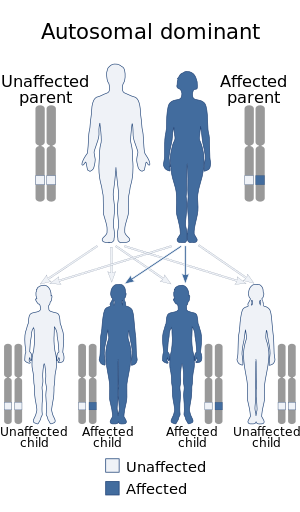Li Fraumeni syndrome
| Li–Fraumeni syndrome | |
|---|---|
| Synonyms | Sarcoma family syndrome of Li and Fraumeni |
 |
|
| Li–Fraumeni syndrome is inherited via an autosomal dominant manner | |
| Classification |
· ·
|
|---|---|
| External resources |
Li–Fraumeni syndrome is a rare, autosomal dominant, hereditary disorder (except for the greater than 300,000 Brazilian carriers of the R337H variant ) that pre-disposes carriers to cancer development. It was named after two American physicians, Frederick Pei Li and Joseph F. Fraumeni, Jr., who first recognized the syndrome after reviewing the medical records and death certificates of 648 childhood rhabdomyosarcoma patients. This syndrome is also known as the sarcoma, breast, leukaemia and adrenal gland (SBLA) syndrome.
The syndrome is linked to germline mutations of the p53 tumor suppressor gene, which encodes a transcription factor (p53) that normally regulates the cell cycle and prevents genomic mutations. The mutations can be inherited, or can arise from mutations early in embryogenesis, or in one of the parent's germ cells.
Li–Fraumeni syndrome is characterized by early onset of cancer, a wide variety of types of cancers, and development of multiple cancers throughout one's life.
LFS1: Mutations in TP53
LFS2: Mutations in CHEK2
Another variant of Li–Fraumeni that remains somewhat controversial, is a mutation of the CHEK2 (or CHK2) gene. CHK2 is also a tumor suppressor gene. CHK2 regulates the action of p53. CHK2 is activated by ATM which detects DNA damage, and in this way DNA damage information can be conveyed to p53 to indirectly arrest the cell cycle at that point for DNA repair to be able to take place or to cause apoptosis (programmed cell death).
LFS-L:
Families that do not conform to the criteria of classical Li–Fraumeni syndrome have been termed "LFS-like". LFS-like individuals generally do not have any detectable p53 mutations, and tend to be diagnosed on either the Birch or Eeles criteria.
A third locus has been mapped to the long arm of chromosome 1 (1q23) but no gene has yet been identified.
...
Wikipedia
